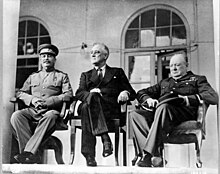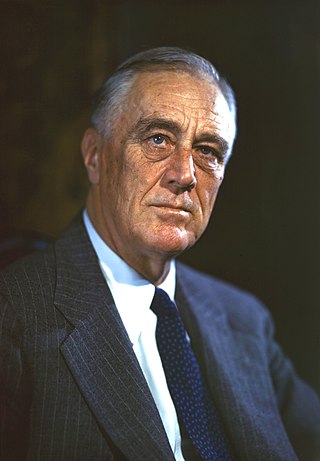
Franklin Delano Roosevelt, commonly known by his initials FDR, was an American statesman and politician who served as the 32nd president of the United States from 1933 until his death in 1945. He was a member of the Democratic Party and is the only U.S. president to have served more than two terms. His initial two terms were centered on combating the Great Depression, while his third and fourth saw him shift his focus to America's involvement in World War II.
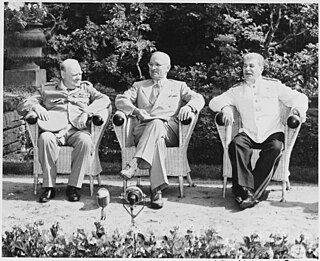
The Potsdam Conference was held at Potsdam in the Soviet occupation zone from July 17 to August 2, 1945, to allow the three leading Allies to plan the postwar peace, while avoiding the mistakes of the Paris Peace Conference of 1919. The participants were the Soviet Union, the United Kingdom, and the United States. They were represented respectively by General Secretary Joseph Stalin, Prime Ministers Winston Churchill and Clement Attlee, and President Harry S. Truman. They gathered to decide how to administer Germany, which had agreed to an unconditional surrender nine weeks earlier. The goals of the conference also included establishing the postwar order, solving issues on the peace treaty, and countering the effects of the war.

The Tehran Conference was a strategy meeting of Joseph Stalin, Franklin D. Roosevelt, and Winston Churchill from 28 November to 1 December 1943. It was held at the Soviet Union's embassy at Tehran in Iran. It was the first of the World War II conferences of the "Big Three" Allied leaders and closely followed the Cairo Conference, which had taken place on 22–26 November 1943, and preceded the 1945 Yalta and Potsdam conferences. Although the three leaders arrived with differing objectives, the main outcome of the Tehran Conference was the Western Allies' commitment to open a second front against Nazi Germany. The conference also addressed the 'Big Three' Allies' relations with Turkey and Iran, operations in Yugoslavia and against Japan, and the envisaged postwar settlement. A separate contract signed at the conference pledged the Big Three to recognize Iranian independence.

The Charter of the United Nations (UN) is the foundational treaty of the United Nations. It establishes the purposes, governing structure, and overall framework of the UN system, including its six principal organs: the Secretariat, the General Assembly, the Security Council, the Economic and Social Council, the International Court of Justice, and the Trusteeship Council.

The Yalta Conference, held 4–11 February 1945, was the World War II meeting of the heads of government of the United States, the United Kingdom and the Soviet Union to discuss the postwar reorganization of Germany and Europe. The three states were represented by President Franklin D. Roosevelt, Prime Minister Winston Churchill, and General Secretary Joseph Stalin. The conference was held near Yalta in Crimea, Soviet Union, within the Livadia, Yusupov, and Vorontsov palaces.
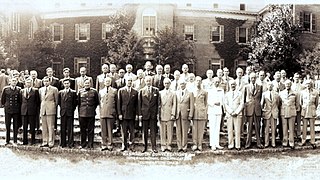
The Dumbarton Oaks Conference, or, more formally, the Washington Conversations on International Peace and Security Organization, was an international conference at which proposals for the establishment of a "general international organization", which was to become the United Nations, were formulated and negotiated. The conference was led by the Four Policemen – the United States, the United Kingdom, the Soviet Union, and China. It was held at the Dumbarton Oaks estate in Washington, D.C., from August 21, 1944, to October 7, 1944.

The Atlantic Charter was a statement issued on 14 August 1941 that set out American and British goals for the world after the end of World War II, months before the US officially entered the war. The joint statement, later dubbed the Atlantic Charter, outlined the aims of the United States and the United Kingdom for the postwar world as follows: no territorial aggrandizement, no territorial changes made against the wishes of the people (self-determination), restoration of self-government to those deprived of it, reduction of trade restrictions, global co-operation to secure better economic and social conditions for all, freedom from fear and want, freedom of the seas, abandonment of the use of force, and disarmament of aggressor nations. The charter's adherents signed the Declaration by United Nations on 1 January 1942, which was the basis for the modern United Nations.

The Cold War originated in the breakdown of relations between the two main victors in World War II: United States and the Soviet Union, and their respective allies, the Western Bloc and the Eastern Bloc, in the years 1945–1949.
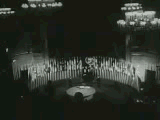
The history of the United Nations has its origins in World War II beginning with the Declaration of St James's Palace. Taking up the Wilsonian mantle in 1944–1945, US President Franklin D. Roosevelt pushed as his highest postwar priority the establishment of the United Nations to replace the defunct League of Nations. Roosevelt planned that it would be controlled by the United States, Soviet Union, United Kingdom and China. He expected this Big Four would resolve all major world problems at the powerful Security Council. However the UN was largely paralyzed by the veto of the Soviet Union when dealing with Cold War issues from 1947 to 1989. Since then its aims and activities have expanded to make it the archetypal international body in the early 21st century.
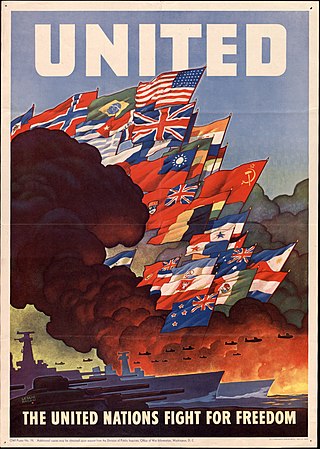
The Declaration by United Nations was the main treaty that formalized the Allies of World War II and was signed by 47 national governments between 1942 and 1945. On 1 January 1942, during the Arcadia Conference, the Allied "Big Four"—the United States, the United Kingdom, the Soviet Union, and China—signed a short document which later came to be known as the United Nations Declaration, and the next day the representatives of 22 other nations added their signatures.

The Allies, formally referred to as the United Nations from 1942, were an international military coalition formed during World War II (1939–1945) to oppose the Axis powers. Its principal members by the end of 1941 were the "Big Four" – United Kingdom, United States, Soviet Union, and China.
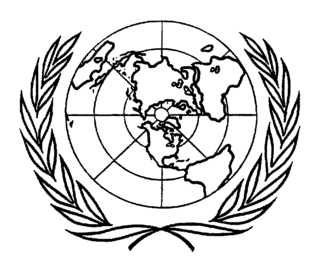
The United Nations Conference on International Organization (UNCIO), commonly known as the San Francisco Conference, was a convention of delegates from 50 Allied nations that took place from 25 April 1945 to 26 June 1945 in San Francisco, California, United States. At this convention, the delegates reviewed and rewrote the Dumbarton Oaks agreements of the previous year. The convention resulted in the creation of the United Nations Charter, which was opened for signature on 26 June, the last day of the conference. The conference was held at various locations, primarily the War Memorial Opera House, with the Charter being signed on 26 June at the Herbst Theatre in the Veterans Building, part of the Civic Center. A square adjacent to the Civic Center, called "UN Plaza", commemorates the conference.

Harry S. Truman's tenure as the 33rd president of the United States began on April 12, 1945, upon the death of president Franklin D. Roosevelt, and ended on January 20, 1953. He had been vice president for only 82 days when he succeeded to the presidency. Truman, a Democrat from Missouri, ran for and won a full four-year term in the 1948 presidential election, in which he narrowly defeated Republican nominee Thomas E. Dewey and Dixiecrat nominee Strom Thurmond. Although exempted from the newly ratified Twenty-second Amendment, Truman did not run for a second full term in the 1952 presidential election because of his low popularity. He was succeeded by Republican Dwight D. Eisenhower.

Leo Pasvolsky was a journalist, economist, state department official and special assistant to Secretary of State Cordell Hull. He was one of the United States government's main planners for the post World War II world and "probably the foremost author of the UN Charter." Thomas Connally said in his memoirs "Certainly he had more to do with writing the framework of the charter than anyone else." His New York Times obituary is subtitled "Wrote Charter of World Organization." A short, rotund, mustachioed pipe smoker with a very large and round head, he joked that he might find it easier to roll than to walk. An aide compared him to the third little pig in the Three Little Pigs, Hull called him "Friar Tuck". A hardworking "one-man think tank" for Hull, he preferred to stay invisible, in the background. In the words of Richard Holbrooke, he "was one of those figures peculiar to Washington – a tenacious bureaucrat who, fixed on a single goal, left behind a huge legacy while virtually disappearing from history."

The term Big Four Conference may refer to one of several conferences between heads of state or foreign ministers of the victorious nations after World War I (1914–18) or during and after World War II (1939–45).
The Declaration of the Four Nations on General Security, or Four Power Declaration, was signed on 30 October 1943, at the Moscow Conference by the Big Four: the United States, the United Kingdom, the Soviet Union, and China. The declaration formally established the four-power framework that would later influence the international order of the postwar world. It was one of four declarations signed at the conference; the others were the Declaration on Italy, the Declaration on Austria, and the Declaration on German Atrocities.

The third presidential term of Franklin D. Roosevelt began on January 20, 1941, when he was once again inaugurated as the 32nd president of the United States, and the fourth term of his presidency ended with his death on April 12, 1945. Roosevelt won a third term by defeating Republican nominee Wendell Willkie in the 1940 United States presidential election. He remains the only president to serve for more than two terms. Unlike his first two terms, Roosevelt's third and fourth terms were dominated by foreign policy concerns, as the United States became involved in World War II in December 1941.

The main issues of the United States foreign policy during the 1945–1953 presidency of Harry S. Truman include:
The foreign policy of the United States was controlled personally by Franklin D. Roosevelt during his first and second and third and fourth terms as the president of the United States from 1933 to 1945. He depended heavily on Henry Morgenthau Jr., Sumner Welles, and Harry Hopkins. Meanwhile, Secretary of State Cordell Hull handled routine matters. Roosevelt was an internationalist, while powerful members of Congress favored more isolationist solutions in order to keep the U.S. out of European wars. There was considerable tension before the Attack on Pearl Harbor in December 1941. The attack converted the isolationists or made them irrelevant. The US began aid to the Soviet Union after Germany invaded it in June 1941. After the US declared war in December 1941, key decisions were made at the highest level by Roosevelt, Britain's Winston Churchill and the Soviet Union's Joseph Stalin, along with their top aides. After 1938 Washington's policy was to help China in its war against Japan, including cutting off money and oil to Japan. While isolationism was powerful regarding Europe, American public and elite opinion strongly opposed Japan.

The Cold War from 1947 to 1948 is the period within the Cold War from the Truman Doctrine in 1947 to the incapacitation of the Allied Control Council in 1948. The Cold War emerged in Europe a few years after the successful US–USSR–UK coalition won World War II in Europe, and extended to 1989–1991. It took place worldwide, but it had a partially different timing outside Europe. Some conflicts between the West and the USSR appeared earlier. In 1945–1946 the US and UK strongly protested Soviet political takeover efforts in Eastern Europe and Iran, while the hunt for Soviet spies made the tensions more visible. However, historians emphasize the decisive break between the US–UK and the USSR came in 1947–1948 over such issues as the Truman Doctrine, the Marshall Plan and the breakdown of cooperation in governing occupied Germany by the Allied Control Council. In 1947, Bernard Baruch, the multimillionaire financier and adviser to presidents from Woodrow Wilson to Harry S. Truman, coined the term "Cold War" to describe the increasingly chilly relations between three World War II Allies: the United States and British Empire together with the Soviet Union.
